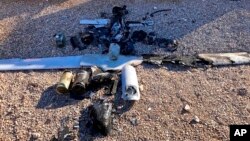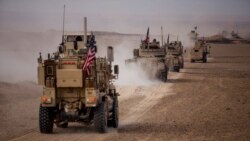U.S. and coalition forces are striking back following a series of rocket and drone attacks on bases in Syria and Iraq by militias linked to Iran.
The U.S.-led coalition Wednesday accused Iranian-backed militias of targeting Green Village, a Syrian Democratic Forces (SDF) base in northeastern Syria that hosts coalition troops, with eight rounds of what it described as indirect fire.
A coalition statement said its forces responded quickly by firing artillery at the launch site, near the town of Mayadin.
Other accounts from the region, posted to social media, suggested U.S. and coalition forces also launched a series of airstrikes to target other possible launch sites and militia members.
U.S. officials refused to comment on the possibility of ongoing operations but said the U.S. and coalition are ready to respond to the escalating attacks by Iran-linked groups.
"Our coalition continues to see threats against our forces in Iraq and Syria by militia groups that are backed by Iran,” U.S. Major General John Brennan, the commander of Combined Joint Task Force - Operation Inherent Resolve, said in a statement.
"The coalition reserves the right to defend itself and partner forces against any threat and will continue to do everything within its power to protect those forces," he added.
Wednesday’s counterstrikes against suspected Iranian-backed militias came a day after coalition forces in the region launched preemptive strikes after seeing indications attackers were preparing to launch an attack on the SDF base.
Separately Wednesday, Iraqi military officials confirmed an attack on Ain al-Asad air base in Iraq’s Anbar province, the second in as many days.
The officials said attackers launched five rockets at the air base, which hosts some U.S. troops, but that all five rockets fell short of the base’s perimeter.
The Qassim al-Jabarin Brigade, an Iraq-based Shiite militia, claimed the attack late Wednesday, saying the “rocket barrage” accurately hit its target, according to a translation by the SITE Intelligence Group, which monitors extremist media.
The militia also threatened continued attacks until the United States suffers a “humiliating exit from all Iraqi lands.”
Analysts say the brigade is thought to be a front for the Iranian-backed Kataib Hezbollah militia.
One day earlier, the U.S. coalition confirmed shooting down two explosives-laden drones before they could reach al-Asad.
Another two “suicide drones” were shot down Monday, on the second anniversary of a U.S. drone strike that killed Iranian Quds Force leader Qassem Soleimani near Baghdad International Airport, which is also used by the international coalition.
At the Pentagon Wednesday, press secretary John Kirby told reporters the uptick in attacks by militias suspected of working with Iran was not unexpected.
“Bottom line is, we had been thinking and preparing for the possibility of stepped-up attacks at the end of December,” Kirby said, noting the increase could be related to the anniversary of the strike that killed Soleimani or to the U.S. mission in Iraq officially transitioning from a combat mission to an advise-and-assist mission at the end of the year.
“The threat is growing in specificity and precision,” he added. “Our commanders are living and breathing that dynamic situation and are encouraged, and we're seeing them do this, to change their own tactics, techniques and procedures as appropriate.”
The U.S. has about 2,500 troops in Iraq and fewer than 1,000 in Syria, according to the U.S. Defense Department.
Speaking in Tehran on Monday, Iranian President Ebrahim Raisi said Iran would take revenge for Soleimani’s death if former U.S. President Donald Trump and former Secretary of State Mike Pompeo are not prosecuted.
VOA Pentagon Correspondent Carla Babb contributed to this report.





